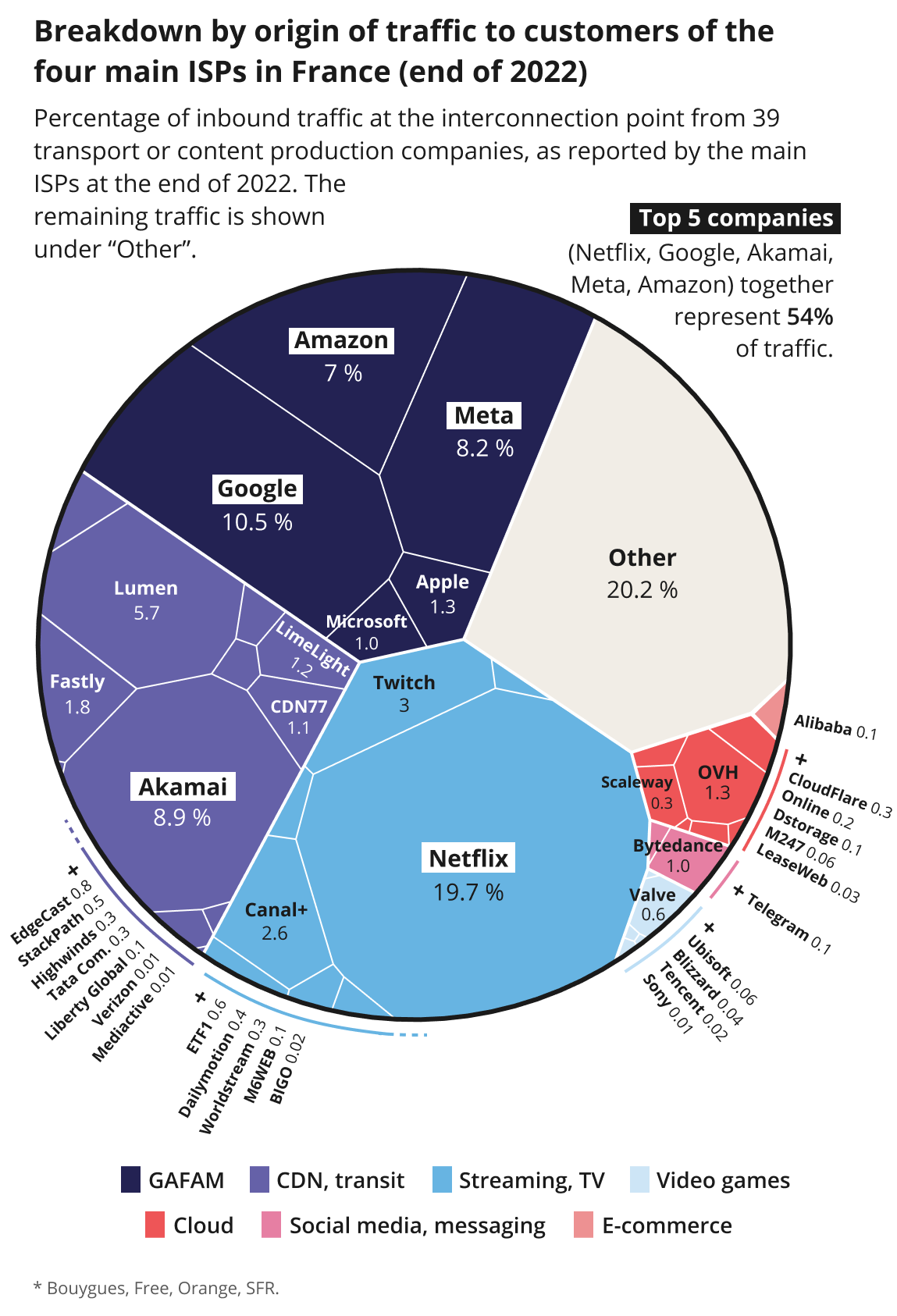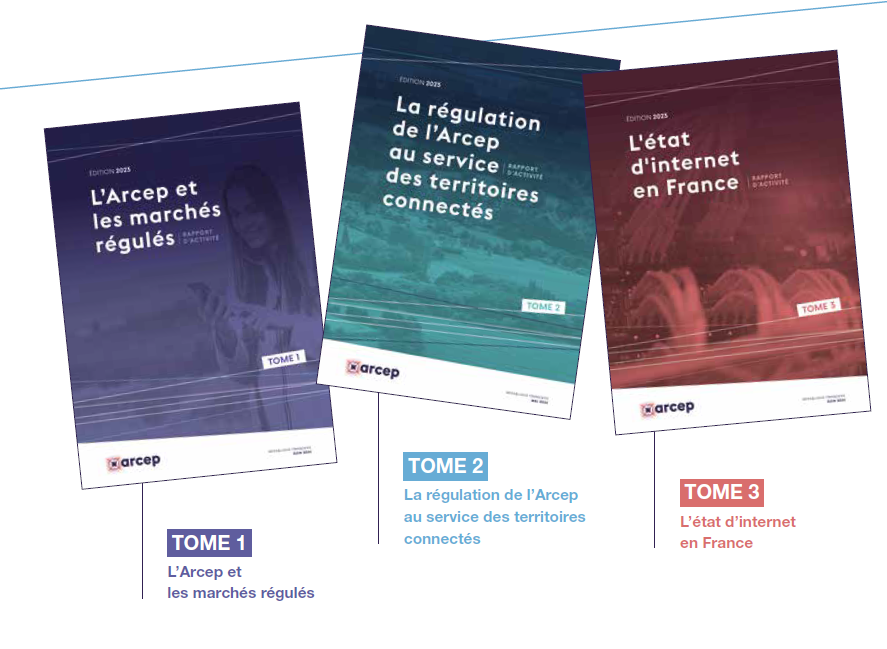Arcep is publishing its annual Report on the State of the Internet in France, the third part of the account of its activities that the Authority submits to Parliament. It details the latest works and analyses performed to ensure that the Internet continues to run smoothly and develop as a “common good”. In particular, the report examines Internet quality of service, data interconnection, the transition to IPv6, net neutrality, the economic regulation of platforms and data, and reducing the digital environmental footprint.
Measuring Internet quality of service: seven fixed network and 11 mobile network testing tools now compliant with Arcep’s Code of Conduct, and the “Access ID Card” API being implemented in all new boxes
To improve both how internet quality of service (QoS) is measured and the information made available to users, Arcep published a Code of Conduct, which was updated in 2020, to encourage players involved in testing QoS to guarantee a minimum level of transparency and robustness, both for their test protocols and in the presentation of their findings. As of the end of 2022, seven tools for measuring fixed network QoS and 11 for measuring mobile network QoS had declared themselves compliant with Arcep’s Code of Conduct.
The Authority also continues to support the implementation of the “Access ID Card” API designed to be deployed on Internet boxes to enable more reliable speed test comparisons. This API creates the ability to send speed test tools information about the internet access line being tested (technology used, headline speed, simultaneous traffic, etc.) so that the testing tools can factor them in. Today, every new box has this API installed, and a first measuring tool – namely Nperf – is using it.
Supervising data interconnection: Arcep has been collecting data for 10 years, during which traffic has increased 20-fold
Coinciding with the report’s publication is the release of the latest update of Arcep’s Barometer of data interconnection. This marks the 10th year of collecting data on interconnection. Between the start of 2012 and 2022, incoming interconnection traffic to the country’s four main Internet service providers (ISP) has increased by 20 times, reaching 43.2 Tbit/s at the end of 2022 (+21.5% YoY). ISPs’ installed capacity has grown proportionately during that time, rising from 5.4 Tbit/s at the start of 2022 to 108 Tbit/s at the end of 2022.
In 2022, 54% of the traffic to the customers of France’s largest ISPs came from five companies: Netflix, Google, Akamai, Meta and Amazon. The remainder (46%) came from a wide variety of players that interconnect with ISPs.

Guaranteeing Net neutrality: evaluating application of the Open Internet Regulation at the European level
Europe’s Open Internet Regulation (OIR) seeks to give the more than 450 million citizens of Europe access to an open Internet by enshrining the principle of “Net neutrality” in European Law. In particular, this text guarantees users’ right to access and distribute information and content on line and use terminal equipment of their choice, and imposes an obligation on ISPs to treat “all traffic equally, when providing Internet access services, without discrimination, restriction or interference, and irrespective of the sender and receiver, the content accessed or distributed, the applications or services used or provided, or the terminal equipment used”.[1] In 2022, BEREC (the Body of European Regulators for Electronic Communications) finalised the update to its guidelines to assist regulators in applying this regulation. The updated guidelines factor in the Orders from the Court of Justice of the European Union (CJEU) from 2021 on zero-rating practices based on business considerations, which the Court ruled were contrary to the obligation set forth in the OIR to treat all traffic equally.
Arcep also participated, within BEREC, in drafting an evaluation of the application of the “Open Internet“ Regulation, which was published in December 2022. Seven years after its adoption, European NRAs agree on how vital this regulation is for ensuring openness and the Internet’s smooth operation, while guaranteeing the freedom to innovate. The European Commission took this opinion into account in its report reviewing the OIR, published in April 2023. The Commission shares BEREC’s conclusions which underscore the regulation’s ability to adapt to (notably technological) changes. It nevertheless points to certain inherent challenges in the ecosystem to the Open Internet Regulation’s application, notably the openness of devices and the definition of so-called “specialised” services.
Shepherding the ecosystem’s transition to IPv6: still tremendous disparities between the different Internet players
The annual report also coincides with the latest update to Arcep’s Barometer of the transition to IPv6. The rate of IPv6 use has progressed nationally to reach 62% in mid-2023 (compared to 51.2% in June 2022). French ISPs have made progress in their transition to IPv6 on both fixed and mobile networks. According to the Barometer’s forecasts, by mi-2025 94% of all retail customers on fixed networks, and 88% of retail customers on mobile networks should have access to IPv6 addressing by default. This is not the case with web hosting companies that continue to lag behind in their transition to IPv6: as of mid-2022 only 25% of websites and 8.3% of mail servers were IPv6-ready.
Crafting regulation for digital platforms and data: Arcep and BEREC involved in implementing the Digital Markets Act and the European data sharing strategy
Close to one year after the adoption of the Digital Markets Act(DMA), Arcep and BEREC continue to work on helping to craft economic regulation for the digital ecosystem. In late 2022, BEREC published a report on the openness of the Internet ecosystem produced by the Digital Markets working group, which is co-chaired by Arcep. Before the end of 2023, BEREC and Arcep will devote themselves the application of the Data Act and the Data Governance Act. BEREC Is also part the High Level Group responsible for advising the European Commission on the application of the DMA.
Tackling digital’s environmental challenges
Current trends for the digital environmental footprint make it vital for all stakeholders to become accountable for reducing the sector’s impact on the environment (greenhouse gas emissions, consumption of resources, including metals and minerals, biodiversity…).
The sustainable design of digital services is one of the levers that Arcep has identified for reducing the digital environmental footprint. The report on the State of the Internet provides examples such as the role that codecs (compression algorithms) play in reducing the impact of video, which represented the vast majority of Internet traffic in 2022 (66% according to Sandvine[2]).
Arcep also provides a reminder of its latest work on the digital environmental footprint: the ADEME-Arcep studies on the digital environmental footprint in 2020 and up to 2030 and 2050, and the two editions of the annual survey on “Achieving digital sustainability” which compiles data from France’s four largest telecom operators on their greenhouse gas emissions, and on the recycling and refurbishing of mobile phones.
Readers of the Report on State of the Internet: we want to hear from you
Since its first edition in 2017, the report on the State of the Internet in France has continued to evolve to keep pace with Arcep’s new activities and duties, working to ensure that the Internet continues to run smoothly, and with events that affect the ecosystem. As it prepares future editions of the report, Arcep wants to gather feedback from its readers. To this end, a dedicated form will be available on the Arcep website until 21 September: https://www.arcep.fr/sondage/le-rapport-sur-letat-dinternet-en-france-edition-2023.html

A three-volume annual report: three facets of Arcep’s actions
In accordance with the Independent Authorities Act (Loi sur les Autorités administratives indépendantes, AAI) adopted in January 2017, Arcep is publishing the 2023 edition of its annual report in three volumes:
Volume 1 “Arcep and regulated markets”provides an update on Arcep’s responsibilities, and the actions and decisions carried out in 2022. It also details Arcep’s European and international activities, which have contributed to the construction of European regulation, and the global outreach of French telecoms regulation.
Volume 2 “Regulation in support of connected territories” is devoted to Arcep’s actions in support of regional connectivity. This document is addressed to elected officials, local authority and operator representatives consumer associations and operators.
Volume 3 “The State of the Internet in France” is devoted in particular to the actions taken to monitor compliance with Net neutrality and the use of IPv6 addressing technologies, in accordance with the European Open Internet Regulation and the Independent Authorities Act. It also includes chapters on internet quality of service, ISPs’ data interconnection, achieving digital sustainability and the digital sector’s economic regulation.
Associated documents:
- Report on the State of the Internet in France – 2023 edition
- Extract in English: Supervising data interconnection / Guaranteeing net neutrality
- 2022 milestones
- Barometer of interconnection in France
- Press conference presentation
[1] Article 3(3) of Open Internet Regulation No. 2015/2120
[2] Sandvine, The Global Internet Phenomena Report, January 2022: https://www.sandvine.com/hubfs/Sandvine_Redesign_2019/Downloads/2023/reports/Sandvine%20GIPR%202023.pdf
